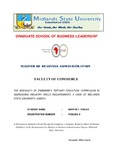Please use this identifier to cite or link to this item:
https://cris.library.msu.ac.zw//handle/11408/2450Full metadata record
| DC Field | Value | Language |
|---|---|---|
| dc.contributor.author | Kweza, Martin T. | - |
| dc.date.accessioned | 2017-06-30T14:02:56Z | - |
| dc.date.available | 2017-06-30T14:02:56Z | - |
| dc.date.issued | 2014-10 | - |
| dc.identifier.uri | http://hdl.handle.net/11408/2450 | - |
| dc.description.abstract | The research sought to assess the adequacy of Zimbabwe’s tertiary education in addressing industry skills requirements using Midlands State University as a case study. The research was premised on the obtaining stakeholder approach to tertiary education. The Midlands State University is guided by its mission to be a stakeholder driven institution of which industry as absorbers of university graduates is a key stakeholder. The research therefore sought to evaluate the extent to which industry expectations are being met by tertiary education. The employed a mixed methods approach although with a strong orientation towards the qualitative methodology. The major data collection tools employed were self administered questionnaires and interviews that were circulated to university lecturers, senior executive from ten parastatals and former Midlands State University students employed in the ten parastatals. The research established that university curriculum is based on international benchmarking, lecturer’s own initiative and university policy with minimal industry involvement. Industry involvement and input into university curriculum came through work related learning reports. Findings also suggest that the majority of senior executives believe that university graduates do not add value when employed in organization requiring further training, while lecturers feel that the curriculum is adequate in preparing graduates for industry and arguing that industry was not the only stakeholder. Furthermore it was noted that the participating organizations did have challenges in filling certain position and felt that graduates lacked skills related business acumen and practical appreciation of the business world. The major challenges faced by the university in fulfilling its mandate is mainly related to financial challenges in sustain required university activities. The research recommended a more collaborative and partnership approach to curriculum development and involvement of senior corporate executives in the delivery of teaching so as to allow students a chance to interact with would be employers and also get an appreciation of industry captains expectations. | en_US |
| dc.language.iso | en | en_US |
| dc.publisher | Midlands State University | en_US |
| dc.subject | Tertiary education | en_US |
| dc.subject | Curriculum | en_US |
| dc.title | The adequacy of Zimbabwe’s tertiary education curriculum in addressing industry skills requirements. A case of Midlands State University, Gweru. | en_US |
| item.languageiso639-1 | en | - |
| item.grantfulltext | open | - |
| item.fulltext | With Fulltext | - |
| Appears in Collections: | Masters In Business Administration | |
Page view(s)
210
checked on Jan 11, 2026
Download(s)
146
checked on Jan 11, 2026
Google ScholarTM
Check
Items in MSUIR are protected by copyright, with all rights reserved, unless otherwise indicated.




